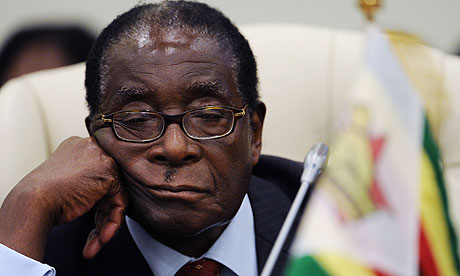
MORE THAN 80 people have been arrested on charges of insulting President Robert Mugabe since 2010, human rights lawyers said yesterday.
MOSES MATENGA STAFF REPORTER
The revelations came on the eve of Justice minister Emmerson Mnangagwa’s appearance at the Constitutional Court (Concourt) today to defend the controversial insult laws.
This follows a ruling by the Concourt last year that provisions of the Criminal Law (Codification and Reform) Act: The Criminal Code, to do with insulting and undermining the authority of the president were unconstitutional.
Mnangagwa was asked by the court to provide reasons why the law should not be struck down and the minister has shown his willingness to defend the code.
Zimbabwe Lawyers for Human Rights (ZLHR) spokesperson Kumbirai Mafunda said victims of the law included senior officials of the opposition MDC formations, pressure groups and ordinary Zimbabweans.
They have been arrested and charged with “insulting Mugabe” and/or “communicating statements prejudicial to the State”.
“More than 80 people since 2010 have fallen foul to Section 33 of the Criminal Law (Codification and Reform) Act: The Criminal Code, where individuals have been charged with allegedly insulting and undermining the authority of the president,” Mafunda said.
- Chamisa under fire over US$120K donation
- Mavhunga puts DeMbare into Chibuku quarterfinals
- Pension funds bet on Cabora Bassa oilfields
- Councils defy govt fire tender directive
Keep Reading
The Concourt made the observation in a landmark judgment in a case where Alpha Media Holdings editor-in-chief Vincent Kahiya and former NewsDay editor Constantine Chimakure were accused of publishing falsehoods in 2009.
Kahiya and Chimakure were accused of “publishing or communicating statements prejudicial to the State” after the Zimbabwe Independent revealed names of State agents accused of torture.
The two journalists challenged the constitutionality of the insult law.
Mnangagwa, through the office of the Prosecutor-General argued that the relevant section of the law, Section 31 (a)(iii) of the Criminal Law (Codification and Reform) Act which the court was seeking to invalidate, should be maintained.
The full Concourt bench called for the invalidation of the law on the basis that it contravened section 20 (1) of the Constitution. However, Mnangagwa argued that the Concourt had “failed” to carefully take a correct approach in examining the questions before it by confining itself to the particular cases.










